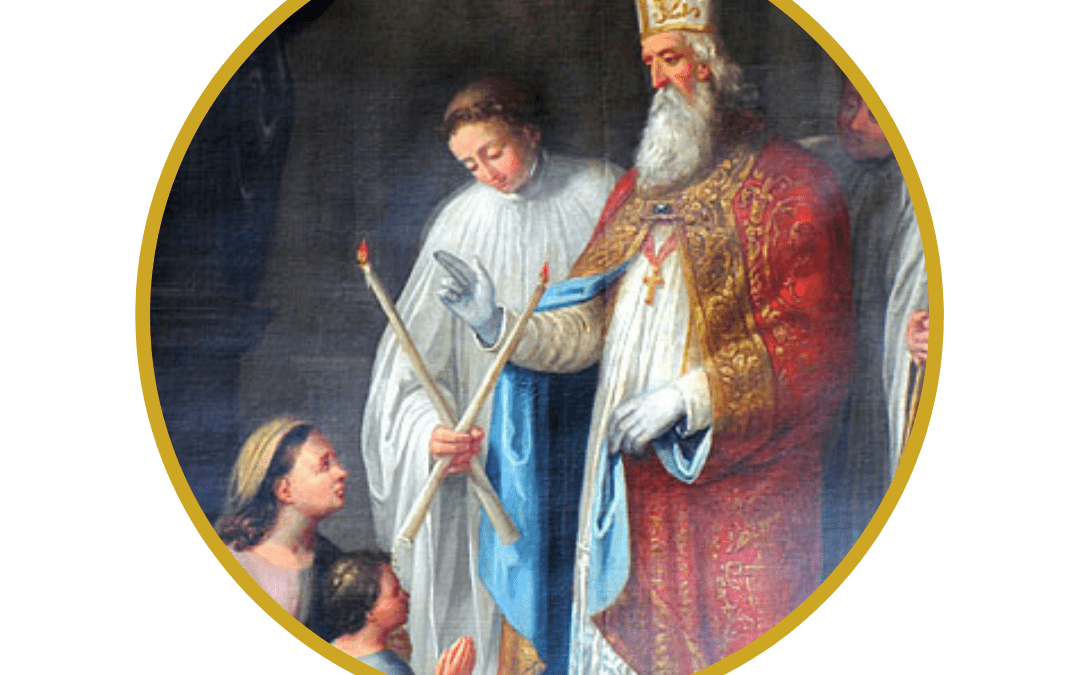3 February: Feast of Saint Blaise. Saint Blaise was an early-fourth-century physician from Armenia. He was also the bishop of Sebastea. Most stories of his life were written 400 years after his martyrdom in the Acts of St. Blaise. Blaise was known to be a good bishop, working hard to encourage the spiritual and physical health of his people. He fulfilled his duties from a humble hermitage in a cave. He was known for many miraculous cures. Stories say that Blaise even healed injured wild animals who would show up at his cave seeking help. In the year 316, the governor arrested Blaise for being a Christian. While being escorted to prison, a distraught woman ran up to Blaise. She was carrying her young son who was choking on a fishbone. She laid the boy at the bishop’s feet. The boy was immediately healed. Another tale tells of a woman whose pig had been carried off by a wolf. The woman begged Blaise to help her. He promised that her request would be granted. Shortly afterwards, the wolf appeared at the woman’s door depositing the uninjured pig at her feet. Despite the miracles, the governor insisted that Blaise renounce his faith and sacrifice to pagan idols. The first time Blaise refused, he was beaten. The next time he was put on a stone table used for combing out wool and his flesh was flayed with the prickly metal combs that are used to remove tiny stones from wool. Finally, Blaise was beheaded. Saint Blaise is one of the Fourteen Holy Helpers (popular saints of the Middle Ages). Saint Blaise’s intercession is now invoked against choking and other ailments of the throat. He is the patron saint of throat illnesses, animals, wool combers, and wool trading.
The traditional Catholic practice for this feast day is the blessing of throats. The priest uses two of the newly blessed candles from the Feast of Candlemas (Candlemas, which occurs 40 days after Christmas on February 2nd, celebrates the Presentation of the Lord in the Temple. When holy Simeon saw the baby, he said: “For my eyes have seen your salvation which you prepared in sight of all the peoples, a LIGHT for revelation to the Gentiles, and glory for your people Israel.” From these words comes the traditional Catholic practice of the blessing of candles.). The two candles are tied together in the middle to form a cross. The priest holds the candles over the throat of each person and prays the blessing: Through the intercession of Saint Blaise, bishop and martyr, may God deliver you from all ailments of the throat and from every other illness: in the name of the Father, and of the Son, and of the Holy Spirit. Amen. If you are not able to attend Mass and receive this blessing, it may be done at home by the head of the household.
Ideas for celebrating in your home:
- According to a Milanese tradition, eating panettone first thing on February 3 will safeguard the throat against illness. Here is a recipe for Panettone French Toast.
- Fish should definitely be on tonight’s dinner menu in honor of Saint Blaise. If you’re feeling ambitious, try making a whole fish. Here is a recipe for fried whole tilapia fish.
- Saint Blaise bread sticks: In Europe, there is a tradition of giving blessed bread to others on the feast of St. Blaise. Homemade or store-bough dough is shaped into breadsticks (that look like a bishop’s staff) called St. Blaise Sticks or Pan bendito. Serve these with your fish dinner. Idea here.
- Make Saint Blaise cookies for dessert (this is a fun edible craft activity for kids!)
- Be sure to light candles on your table today; preferably ones that were blessed on Candlemas!
- Another way to remember Saint Blaise and his gift for healing: use this day to restock the medicine cabinet and pantry with health essentials/remedies like bone broth, elderberry syrup, Vitamin C, and homemade soup.
- Have a bonfire tonight: in England, bonfires are lit as part of Blaise’s feast day celebration – probably inspired by the sound of the English word blaze.
(sources: catholic.org; saintsfeastfamily.com; catholicallyear.com; catholiccuisine.blogspot.com; catholicculture.org)

Recent Comments